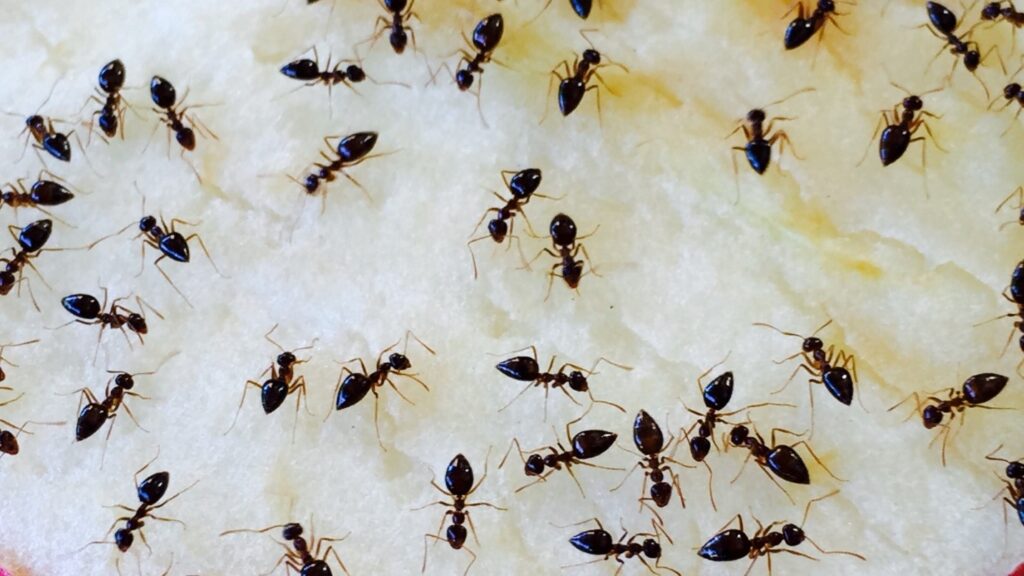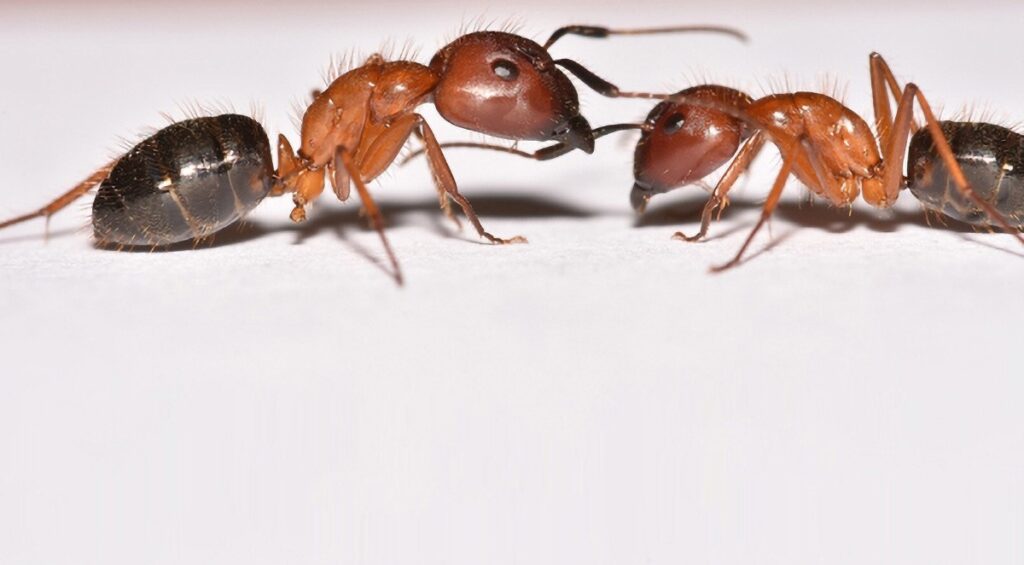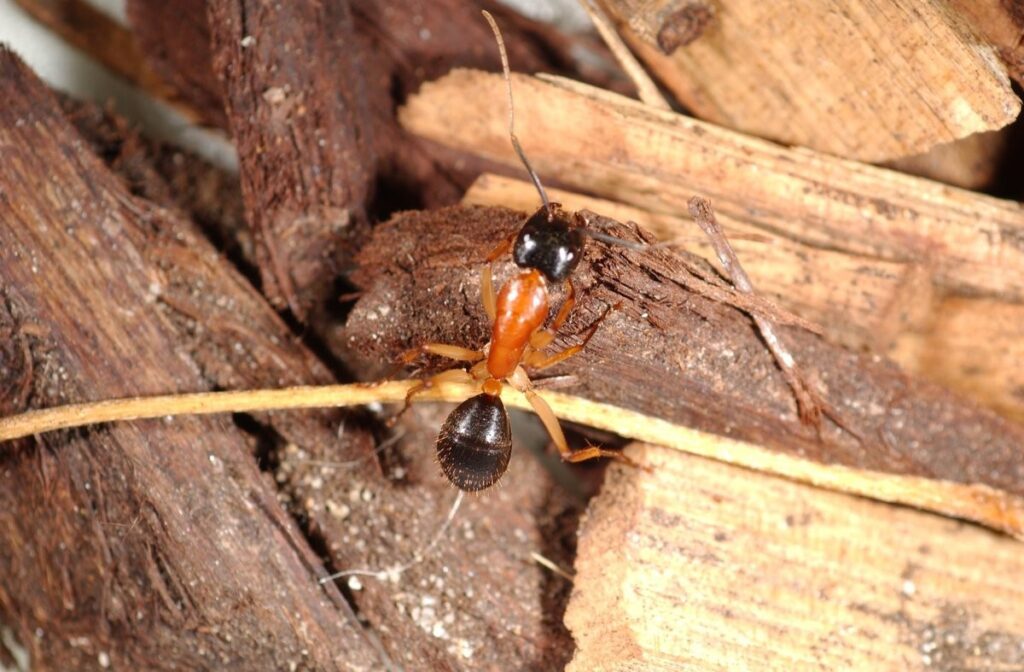How To Get Rid of Ants: 5 Proven Steps to Reclaim Your Kitchen

How To Get Rid of Sugar Ants: 5 Steps To Take Don’t Wait! Contact Wolverine Pest Control today for a free quote at (517) 999-5008. Sugar ants turn your kitchen into their personal buffet.
Here’s a powerful 5-step strategy to exterminate these sugar-loving pests and enjoy a pest-free kitchen:
1. Identify the Enemy:
While nicknames like “sugar ant” exist, it’s more accurate to say these are various small ant species drawn to sugary treats. Common culprits in North America include odorous house ants, pavement ants, and little black ants.
2. Exterminate the Feast:
Sugar ants are relentless foragers. Deny them access to sugary delights by:
• Storing food in airtight containers
•Wiping down counters and floors after cooking
•Taking out trash regularly
•Sealing pet food containers
3. Follow the Trail:
Ants leave scent trails for others to follow. Locate the trail to identify entry points like cracks or gaps around windows, doors, or utility lines.
4. Double Down on Defense:
•Seal Entry Points: Caulk cracks and gaps to prevent future ant invasions.
•Natural Repellents: Peppermint oil spray or white vinegar solution can disrupt ant trails and deter them from entering.
5. Exterminate the Colony:
• Ant Baits: Strategically placed baits allow worker ants to carry the poison back to the colony, eliminating the queen and the entire infestation.
• Professional Help: For severe infestations, consider consulting a professional pest control service.
Sugar Ants: The Tiny Terrorists Taking Over Your Kitchen (And How to Identify Them)

Identifying Sugar Ants:
• Size & Color: Look for tiny (2.5-3mm) black or brown ants, about 1/10th of an inch long.
• Odor: Crush one (carefully!) – if it smells like rotten coconut, it’s likely an odorous house ant, a common sugar ant culprit.
• Behavior: These ants love sugary and sticky substances. Check for them near open food, especially in the kitchen.
Telling Sugar Ants Apart from Look-Alikes:
• Pavement Ant Look-alike: Sugar ants can be confused with pavement ants, also small and black/brown. However, pavement ants are slightly larger (up to 4.2mm) and have distinctive features: pale legs, double spines, and tiny hairs.
•Habitat: While sugar ants may wander into kitchens, pavement ants prefer outdoor cracks and are rarely found indoors unless following a grease trail.
Signs of a Sugar Ant Infestation:
• Tiny black/brown ant gatherings near open food sources.
• Trails of small black/brown ants leading to food crumbs or spills.
• A faint rotten coconut odor (crushed ants only).
Sugar Ants: A 6-Step Guide to Reclaim Your Kitchen
Sugar ants, those pesky little intruders, can turn your kitchen into their personal feeding ground. But before you can banish them, you need to identify the enemy! Here’s a guide to recognizing these sugar-loving pests:
Step 1: Seal Up Their Entry Points
Ants are tiny Houdinis, squeezing through minuscule cracks. Here’s how to fortify your defenses:
•Interior Gaps: Use caulk to seal gaps around baseboards and other small openings.
• Exterior Cracks: For cracks in the foundation or exterior walls, fill them with spackle and apply paint for an extra layer of protection.
Step 2: Starve the Invasion
Sugar ants crave sugary treats. Exterminate their food sources to make your kitchen unappealing:
• Airtight Containers: Store all food, especially sugary items, in airtight containers.
•Clean Up Spills: Promptly clean spills, particularly sweet or sticky ones, to remove any tempting scents.
• Wipe Down Counters: Regularly wipe down countertops with soapy water or cleaning spray to exterminate ant scent trails.
Step 3: Exterminate with Bait TrapsInvasion
Bait traps lure and kill ants, disrupting the colony. Here are your options:
• Store-Bought Traps: Choose sugar ant-specific baits and place them in areas with ant activity. Follow package instructions carefully, especially regarding pet and child safety.
• DIY Bait Traps: Create your traps using boric acid (low-toxic to humans and pets but lethal to ants) mixed with honey or syrup. Alternatively, combine shortening, sugar, and borax for greasy-loving ants. The slow-acting borax allows worker ants to spread the poison to the colony.
Step 4: Natural Repellents for Defense
These natural solutions deter ants and disrupt their communication:
• White Vinegar Spray: Mix equal parts white vinegar and water. Spray ant entry points, trails, and baseboards for a natural ant killer. Apply during peak ant activity (mornings and evenings) for maximum effectiveness.
• Essential Oil Sprays: A few drops of peppermint or lavender essential oil mixed with water creates a natural ant repellent with a pleasant scent (unlike vinegar!). Peppermint oil is particularly effective against various insects.
• Diatomaceous Earth: This fine powder made from crushed marine plankton is deadly to insects but safe for humans and pets. Sprinkle it along ant trails to disrupt their digestive systems.
Step 5: Prevent Future Infestations
Maintaining a clean and ant-unfriendly environment discourages future invasions:
• Regular Cleaning: Practice consistent cleaning to exterminate crumbs and spills that attract ants.
• Sanitation: Keep garbage areas clean and ensure leaky faucets are repaired, especially during dry periods (ants seek water sources).
• Seal Entry Points: Regularly inspect and seal any cracks or gaps in your home’s exterior – a crucial step for a pest-free home.
Step 6: Professional Help
for Tough Infestations
For severe infestations or if DIY methods fail, consider professional help:
• Expertise and Tools: Our Pest Control Exterminators have extensive knowledge and access to effective tools and treatments to eradicate sugar ant colonies.
• Preventative Measures: Consult a professional pest control company like Wolverine Pest Control for insights on preventing future infestations.
• Cost Considerations: Professional sugar ant extermination typically ranges from $200 to $250. Ongoing maintenance services may be available for added peace of mind.
By following these steps, you can effectively exterminate sugar ants and reclaim your kitchen! Remember, vigilance and preventative measures are key to keeping your home ant-free.
Sugar Ant FAQs: Everything You Need to Know to Reclaim Your Kitchen

Q: How to Exterminate Sugar Ants Naturally?
• Vinegar Spray: Mix equal parts water and white vinegar. Spray entry points, trails, and baseboards for a natural ant killer.
• Essential Oil Repellents:: A few drops of peppermint or lavender oil mixed with water create a natural ant deterrent.
• Diatomaceous Earth: This powder (safe for humans and pets) disrupts the ant’s digestive systems. Sprinkle it along ant trails.
SQ: What Attracts Sugar Ants?
•Food Odors: Sugar ants love sweets and meats. Keep food in airtight containers and clean up spills promptly.
• Warm & Moist Places: They often nest in kitchens and pantries, but bathrooms are not uncommon.
Q: Do Sugar Ants Bite?
•Mild-Mannered: Sugar ants bite only in self-defense, and the bites are harmless (unless you have a severe allergy).
Q: What Smells Repel Sugar Ants?
• Natural Repellents: Peppermint oil, lemon juice, coffee grounds, cloves, and bay leaves effectively repel sugar ants.
Q: Do Sugar Ants Hate Vinegar?
• Vinegar Power: Yes! Sugar ants hate the vinegar scent, which disrupts their communication trails.
Q: Sugar Ant Lifespan?
• Worker Ants: Up to 7 years.
• Male Ants: 20 days (mating only).
• Queen Ant: 10-15 years (pampered by workers).
Q: Will Sugar Ants Disappear on Their Own?
•Unlikely: Sugar ants are persistent. If home remedies fail, consider professional pest control.
Q: Finding the Ant Source?
• Bait Trap Trick: Place a bait trap and follow the ant trail back to the entry point.
• Outdoor Inspection: Check woodpiles, leaf litter, and undersiding for ant activity.
Why Choose Wolverine Pest Control for Sugar Ant Removal?
Hear from Wolverine’s Happy Clients!
• “Very dependable and responsive to Pest Control.” – Kenneth Kesselring• “This company is outstanding, very thorough, and great customer service. Would definitely use them again if ever needed.” – Nate Sattler• “I have used Wolverine Pest Services several times for my business. Very professional and does a fantastic job!” – Bloom Wellness• “Great company, very responsive, professional, caring and kind family… Were so impressed, we signed up for additional services!” – Reza Tavakoli (Bee removal & ongoing pest control)• “The family have always been very professional and wonderful. We’ve used their services for 10 years. Prompt service for various pests!” !” – Hope Fan• “Have been a customer of Scott’s for years. Thorough, professional, and friendly. Fair price, good results!” !” -Donald Bracke• “I love that they can be called for special events and will spray an extra time that month. The technician was very friendly and did a great job!” !” -Natalie Draper•Don’t wait! Contact Wolverine Pest Control today for a free quote and reclaim your kitchen from sugar ants!
